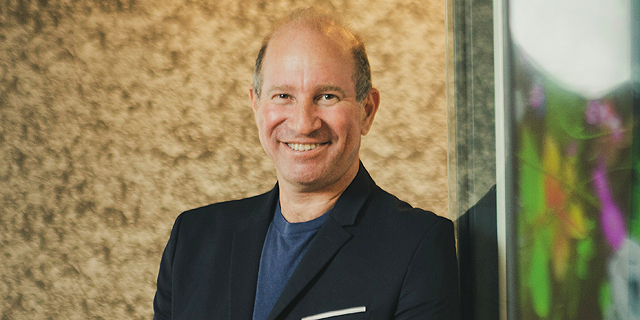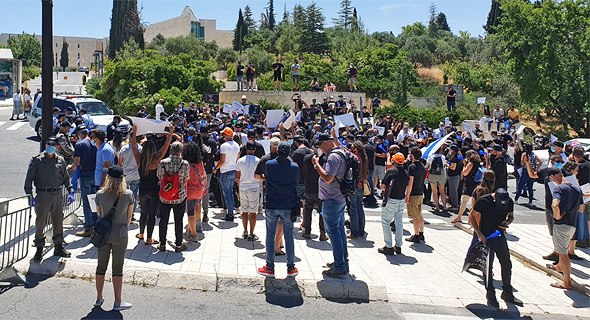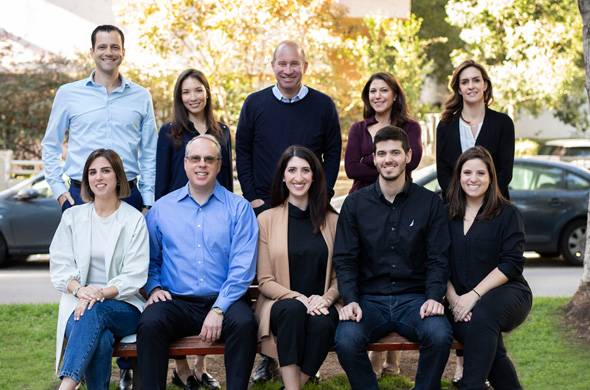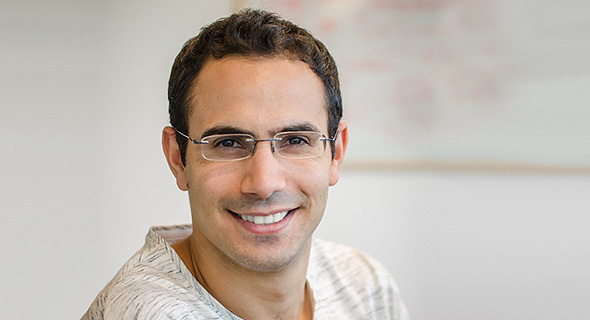
Wurtman’s roller coaster: From fears of bankruptcy in March to $6 billion exits in June
Jerusalem entrepreneur and investor Elie Wurtman, who struck gold with Vroom and Spot.io, shares insights from three months that changed his life
And then, two weeks ago, one of these companies, Spot.io, was sold for $450 million, and last week another one, Vroom, went public on Nasdaq at a market cap of $2.5 billion and the next day the valuation went up to $5.5 billion. Three months, and you went from one extreme to another.
"I'm still floating on air and trying to digest it. It was a huge drama as if the world had flipped over, twice. We were preparing for an IPO, and then we hit rock bottom, and then we peaked, and not once, but twice. It's incomprehensible. Vroom's success is beyond anything I could have imagined. I have had successes in the past, but never to such a degree. I was one of the company's initiators, its first investor and an active chairman, so I can tell you it is a tremendous story. I did it all from here too, from Jerusalem, the farthest away from this market as you can get, and yet we reached a market value that is really hard to digest. "
Speaking with Wurtman last week, one conversation in a series of meetings and talks over the past few months, he did indeed sound as if he was floating on air. He explained that the coronavirus outbreak, which threatened his companies and still threatens many other companies across many industries, was in fact a springboard for two of them, that were especially suited to the corona-stricken world, a world that works remotely and avoids unnecessary human contact. Spot provides cloud services, demand for which has soared during this period, while Vroom is essentially an online platform for buying and selling used cars that saves people who want to sell, check or buy a car to leave their homes and encounter other people. The company operates as a leading dealership in the massive U.S. used car market that is worth $850 billion a year. Parties looking to sell their car to Vroom can send pictures and details through the company’s website and receive an offer. The purchased cars are then collected by Vroom, reconditioned, and sold through the app.
”Following the Covid-19 outbreak, U.S. car dealerships closed overnight. Some public transport also shut down, Uber and Lyft became problematic because people do not want to sit where other people sat before,” said Wurtman. "People said millennials would no longer own a car?" he smiled, “well guess what….”
"So demand for vehicles skyrocketed and people couldn’t or wouldn’t go to a regular dealership. Along comes Vroom and gives them the opportunity to order a car remotely and get it to the house without any human contact, with masks, everything is sterile. And it works the other way around too. You can sell a car without even meeting anyone. We went from trying to avoid the company’s collapse to recruiting new workers. The pandemic has basically empowered our whole vision for the automotive market, created tremendous acceleration, and it’s true for any company that deals with an online product— e-commerce, remote work tools, and automation. The world is moving at a much faster pace now, and many startups are attuned to that."
You moved up Vroom's IPO, it wasn't originally scheduled for last week.
"Yes, because of demand. And on the day of the IPO, we realized that we had built something big here. In terms of Israeli entrepreneurs, this is one of the biggest successes ever, I don't know how many companies have reached a valuation of more than $5 billion in one day. That's why I'm floating. We listed at a valuation of nearly $2.5 billion, which was already beyond expectation, and when trading opened it just doubled in day one. It was really huge. As an investor, it's a major success for the fund, and as an entrepreneur, it's my biggest success to date."
And you saw it all from afar.
"From quarantine ...", he smiled. "My 14-year-old son was diagnosed with coronavirus, though he didn’t have any symptoms. He attends one of the schools that were closed in Jerusalem. So I'm quarantined at home, and I experienced the market opening over the phone with Alon (Bloch, who founded the company with him, ran it until 2016 and today is in New York serving as the CEO of K Health). We wanted to experience it together, it was exhilarating to reach that stage."
Floating on air, but imprisoned at home.
"It was a pretty surreal experience to be locked up in quarantine while turbulent things are happening outside. My son and I were watching TV together and saw a report on the IPO, and he said, 'Dad, today you were on the news with Vroom, yesterday I was on the news because I added a number to the coronavirus statistics. I'm home alone, and half the industry called me up to congratulate me, it slightly sweetened the isolation."
It probably wasn’t only to say congratulations.
"Yes, we are already experiencing a pilgrimage by entrepreneurs. The phone doesn't stop ringing. At the end of the day, that’s what I like most, working with entrepreneurs. I believe in their energy, their ability to be agents of change and I want to be part of it."
How do you celebrate such a huge IPO when you can't even leave the house?
"First of all, I shared it with my kids. In the life of an entrepreneur, a day like that is very meaningful, and I wanted to share it with them. Later, together with my New York partners, the entire staff of the fund, and of Pico Kids (its social-educational enterprise), we raised a toast via Zoom.”
No flying to New York to celebrate with the partners, no party at the office, you couldn’t even enjoy a good meal at a restaurant.
"It's frustrating when it's impossible to celebrate. In normal times I would probably have flown to New York to celebrate with the company's board. But in the end, I was with the important people, from home, on Zoom. My brother's story also provides perspective to the whole thing, planting my feet on the ground, helping to understand where we are in this complex reality. And reality is always complex."
His brother's story does indeed provide perspective. Carmi Wurtman, like his brother, is a renowned Jerusalem entrepreneur, but unlike Elie, he’s not active in high-tech, instead, he’s active in the cultural world and has produced performances by foreign artists such as the Black Eyed Peas, Joe Cocker, Regina Spector, the Pixies and many others and also manages famous local artists and organizes music festivals. While for Ellie Covid-19 produced an unimaginable climax, for Carmi it destroyed years of hard work. "My brother is one of the biggest producers in the city and he has no business. He has been sitting at home for months thinking about what to do with himself because this year he will have no income. I always have to remember that with all the success on the stock exchange, there is a completely different reality out there. People were hard hit, both financially and mentally."
You are two brothers who experienced two sides of the crisis, you profited, he crashed.
"Absolutely. It's a crazy absurdity. We're very good friends and support each other. But the reality is that he is looking down a bottomless pit in terms of his occupation and against my reality ... It's very sad. I think he is very happy for me, and through my brother’s experience, I am aware of the alternative reality and appreciate how difficult it is. I think entrepreneurs should have broad personal responsibility for the society they live in. Changing children's reality in Jerusalem, as we do through the Pico Kids educational project, is no less important than changing the reality of those who want to buy a car in the U.S. I wish that tech companies that perhaps have been less affected by the crisis would create more opportunities and jobs for more people. Some of the employment solutions now can come from those in the industry that have held up, and in general, I think we should think creatively about how to go back to normal. This is one of our big tasks, for us entrepreneurs too.”
What about the other companies you invested in?
"We will know in a year or a year and a half. The crisis is not behind us yet, and there is a big gap between what’s going on in the stock market and what is happening with the economy, people are still sitting at home, and the situation in the U.S. is dire."
The failure: Leaving Israel was a blow
Vroom is Wurtman's baby: he is on the company’s board and a founding partner of the fund that holds nearly 10% of its shares. But the great joy that came from the IPO also holds a bit of a sour taste. Vroom was founded in 2013 with its research and development conducted in Israel while the business side was done entirely in the U.S. But after it acquired its American competitor Texas Direct Auto in 2016, its operations in Israel became unnecessary. The company laid off the Israeli development center’s staff and completely disengaged from Israel, except for the connection to Wurtman and Pico Venture Partners.
"This is my biggest Zionist failure," Wurtman admits, "but it is still a tremendous Israeli success because it started here. It is also a success for the Israeli venture capital industry. We may not have the R&D in the country anymore, but it does not diminish the great success. I continue to invest in the industry in Israel and produce a lot of other successes and opportunities here. "
As an entrepreneur and a major investor, if you insisted Vroom's development center could have stayed here.
"Perhaps. But you hire a CEO and let them run the company, and they want to do everything where the company's market is. Not everything that starts here in Israel can stay here, and sometimes it's a natural and healthy process. At the end of the day, it is an American business, they manage themselves and it is less convenient for them to operate an R&D center here. I take pride in the 6,000 jobs I have created in Israel over the years, so if I failed with 20, it does not hurt my contribution to Jerusalem or the Israeli economy. It’s a giant blow to my ego, but it is the exception."
Still, with all the success and dream valuation, Vroom is only a fraction of the U.S. market.
"Making up a tiny percentage of a market in which 46 million used cars are sold and which rolls $850 billion a year is still pretty significant, and our growth in the market will turn into something far bigger, you have to wait and see where we go. There is no single dominant player in this market, the largest player that has a similar model to ours, CarMax holds 2% of the market, and we have 0.25%."
Are you going to erase the culture of American dealership lots, which has become a cultural icon?
"It won't go away but it's going to change, like the entire industry, all over the world. We have investments in two other Israeli companies operating in this field, also with car dealerships, AutoLeadStar and Ravin AI. Because of the coronavirus outbreak, the industry had no choice but to work in a way that is reminiscent of Vroom. I call it the perfect storm— sometimes there is a storm outside that creates opportunities. It is a plain fact that there is huge demand for the solution that Vroom offers. The crisis quickly exposed us to a large audience that would otherwise only have been exposed to us in a few years. Just like in the case of Zoom, suddenly buying a car remotely has become an obvious choice.”
Will Uber and Gett survive?
"It will take them a long time to recover if we indeed ever go back to the cooperative economy. Conversely, people's memory is very short. Anyone who has been to a restaurant or bar in Tel Aviv in recent weeks can see that everywhere is packed, as if nothing had happened. Some people will say to themselves 'I’m buying a car and leaving public or shared transportation,’ others will return to their former habits. Human nature tends to be social, to seek the closeness of other people. Only in time will we know who will foot the bill for this crisis."
The Secret: Identifying an Ineffective market
Wurtman founded Pico Venture Partners in 2013, and since then it has raised $130 million in two funds, "American enterprises, people who have built companies, who have connections. We give them industry exposure in Israel, and we get exposure to their contacts in return." The total amount that the fund manages is considered low relative to other funds investing in early stage companies. Pitango, for example, recently raised an eighth fund of $175 million, AS’s second fund stands at $120 million, Aleph raised a new fund of $200 million and so on. Pico, on the other hand, is more of a small boutique, which only makes its two major successes in such a short time, all the more impressive. "A small fund that specializes in investing at an early stage and reaches an IPO at such a value— it's pretty rare," Wurtman concedes, "but in the end that's exactly the essence of any investor, knowing how to find these gems." There's also an occasional miss, by the way: the investment in cyber company FileLock, which was sold in 2018, did not recover its investment, and in fact, the fund lost almost 90% in that deal, according to Wurtman. "That happens, too," he says. Vroom and Spot make up for that now.
"Vroom is Pico's major investment and holding, I believed so deeply in the product that we invested in it 20% of the first fund, which was $35 million. We participated in every round from the first day of the company, which in aggregate has raised $700 million, and we made it to the offering. So we're a small fund, but very effective. And the fact that we are small does not mean that we are not doing big things, I think the other companies are also amazing and I hope that in a few years we will be considered one of the best funds in terms of return for investors."
What do you mean by "know how to find these gems"? You have been involved in no less than five exits and IPOs as an entrepreneur and investor, isn't it also a matter of luck?
"Luck is part of it, I don't downplay it, and it's always good that it comes along with the right timing — we entered Vroom’s market at exactly the right time. But I've been doing it for 25 years, so I understand technology, I know the markets and mostly I know how to see things ahead. I have the ability to dream and that is a prerequisite. So, beyond the luck factor, I know that you also have to stick to your goals and be able to see a little into the future, to be able to identify a great opportunity, an industry that is waiting for change or requires change, and of course an amazing team- extraordinary entrepreneurs who are willing to work hard. I have no ability to predict trends, I do not know what the next trend will be for my son, for example, I have no idea, but yes I do have the ability to observe big markets and understand where there are inefficiencies and where there is an opportunity to change reality. That's what I always strive for. I've done it in the media, in cars, and in other areas. Ultimately, these are the waters I swim in."
How did it work with Vroom?
"I went to the United States in 2014 and for the first time in my life walked into a car dealership there. At first, I didn't understand why it worked the way it did, why I had to drive, talk to a salesman, why I couldn't just sit at home and do all that. I didn't understand the logic of how the market worked. That was where I took the leap to 'you can do it differently', 'let's apply it', the place I feel most comfortable in. I came to Texas from Jerusalem, and with the eyes of a stranger, I saw something that seemed pretty obvious to me. Maybe I was naive and maybe it gave me the power to see things a little differently."
With all the capital that has come in from the recent successes, is the fund on its way to raising more money?
"We raised not too long ago, so now is not the time, but I have no doubt the successes of Vroom and Spot will pave the way for more possibilities."
"The Small Exit": Personal investment in a founder
Spot is considered Pico's "small exit" at the moment, which does injustice to the huge deal that would have been considered a great success at any other time; after all, it's a company that raised just over $53 million and was sold for $450 million to U.S. storage giant Netapp, whose market value is about $10 billion. And as far as Pico is concerned, "Spot alone returned almost all of the first fund," Wurtman said, adding that after the dilution of holdings on the eve of the sale, the fund owned 4% percent of the company, which generated about $20 million.
Spot was founded in 2015 by Amiram Shahar, who currently runs it from California, and Liran Pollak, the company's chief technology officer. Born in the computer science faculty of the College of Management as part of Shachar’s graduation project, Spot is currently helping companies that use the big cloud services (Google, Amazon, Microsoft) to streamline their cloud work through storage concentration and cost reduction.
"I started with four Jerusalem guys, saw their drive, which I believe is very strong in Jerusalemites. I knew that Amiram would devour the world, that he would build something major. After dozens of funds told him no, I said yes, I gave him the first check and all the support, and four and a half years later we find ourselves with a huge company that employs almost 200 workers, mostly in Israel, and a sale to an American company during this crazy period, when the world went a little mad with the coronavirus. Nobody could make up such a story."
There are countless cloud and cloud optimization companies, and the network giants are operating intensively in the field. What did you see in Spot that other investors failed to see?
"In general, I believe in big markets. I saw that Amiram was entering one of the big markets in the cloud industry, he talked about making storage more efficient and I realized that there was great potential here, but mostly I was looking at the person, the desire to succeed and the intellectual drive to crack things. As far as I’m concerned, I invested in him personally."
Jerusalem: My Zionist project
Pico's Jerusalem roots are very important to Wurtman. As he mentioned in Spot's case, the fact that the developers are from Jerusalem is meaningful to him. "The fact that innovation that comes out of this city goes on to conquer the world is very exciting. That money comes back here: we continue to invest here, and it allows me to empower Pico Kids (a Jerusalem children's technology education program, that focuses on disadvantaged neighborhoods), our social mission because I believe in social responsibility."
Wurtman arrived in Jerusalem when he was eight years old after his family immigrated from Philadelphia because "my parents decided that Zionism isn’t something you could practice from an American suburb," and here, he says, "my dad literally danced in the streets." His father, a lawyer by training, worked as a real estate broker and his mother was an activist in the battle for the rights of Soviet Jews. The boy absorbed the interest in business and social activism, but at Columbia University, in New York, he studied Talmud and international relations, "because that's what interested me in the time." He does not wear a skullcap and does not describe himself as religious, but goes to the synagogue often and his children attend religious schools, "because I want them to explore the depths of the wonderful things that Judaism offers.”
Alongside the spiritual, Wurtman was always drawn to technology, without ever having studied it in an orderly fashion. ”What I know I learned on the go. I took one college course in programming, in a program I don’t think exists anymore Pascal,” he recalled. When he returned to Jerusalem from New York, he began to dive into the world of technology, and in 1993 established software security company TTR Technologies. There I learned how to raise money, how to sell, how to issue. It was my first exit, and after the company went public it sold for about $80 million and I said, ‘this is easy, amazing. Let's do it again.’” After that, he led two other companies from founding to IPO: Ambient Systems for data transmission through power grids, and DeltaThree for phone calls over the Internet.
"I established Ambient with scientists from the former Soviet Union, they called me Ilushka. The workers used to say ‘we’re on strike. If there is no tea in the kitchen, we won’t work.' So I went and bought tea for five years in advance. It was fun. In the early 2000s, the New York Electric Company bought the company for $40 million. A small part of that was mine."
At Delta Three, he also worked with former Soviet workers and turned it into Jerusalem’s first unicorn, when in 1999 it went public at half a billion dollars and was traded on the next day at 41 billion, just like what happened with Vroom. For Wurtman, Delta is a metaphor for the rise and fall of the Jerusalem tech scene. "In the late 1980s, thanks to former mayors Teddy Kollek and Ehud Olmert, Intel landed in Jerusalem. In 2000 I had 400 young employees here, it looked like Tel Aviv, with breaks for beer and frisbee. Then came the collapse of the Dot Com bubble and the Second Palestinian uprising, and the industry here fell apart, including Delta. Jerusalem entered a period of nuclear winter. The young people, the main workforce, migrated to Tel Aviv," he recalled.
Wurtman also migrated a touch, from the industry itself to its support circle. He went to work at Benchmark Capital and established Pico. Even before the fund, he opened a shared working space by that name. ”We chose PICO because it is an acronym for People, Ideas, Community, and Opportunities. We wanted to reinvigorate the social entrepreneurial community in Jerusalem. To the entrepreneurs, I said, 'pay as much as you can, and if you are a social entrepreneur, don’t worry about it, you don't have to pay.'"
The fund, which he set up together with New York investors Gina LaVersa and Todd Kesselman ("I knew him in the synagogue and he consulted me about immigrating to Israel"), is also trying to empower Jerusalem and is invested in two local companies. Wurtman notes that the fund also invests in companies that were founded by people who grew up in Jerusalem and talks about a Jerusalem DNA, reminiscent of the big entrepreneurs who grew up in the city, including Gil Shwed, Eyal Waldman, Amnon Shashua and others. "The complex realities of the city require people with muscle, creativity, and the ability to solve problems. Even the most non-religious person has to be inspired by the history and spirituality of the city."
Pico's offices are less historic and spiritual, made up of exposed concrete, colored sculptures, and video art installations. “When I opened shop in the garage district of the city, then-mayor Nir Barkat, a man who had invested in tech companies, came up to me and said, ‘Elie, hi-tech won’t happen here, but you built a nice office.’ In the beginning, no one would come. Today there are 60 startups working out of the space and paying Tel Aviv levels rent.”
And yet, the tech scene is in Tel Aviv.
“People are comfortable working with those who look like they do. Here things are less comfy, there are fewer restaurants, there is no sea to distract you. But you have to be creative, there is more intellectual depth. It’s easier to run on a plateau than be mountain folk. But most Israel Nobel Prize winners came from Jerusalem, the Chefs that the Tel Avivians love are from here, lots of the biggest successes in the country came from here. The conditions here produce the DNA of a super entrepreneur. It’s difficult, there is stress and sometimes violence, but people who come here are up to coping with challenges. I chose to raise my children here.”
What are your plans after the recent achievement? What is the dream?
“Since establishing Pico, the salary is no longer what drives me. When I speak of economic development in ideological terms, that is really my life. It is full of business and social activity and I also own a small winery. I’m really missing nothing.”




